小学英语一般过去时完整版
一般过去时单词表
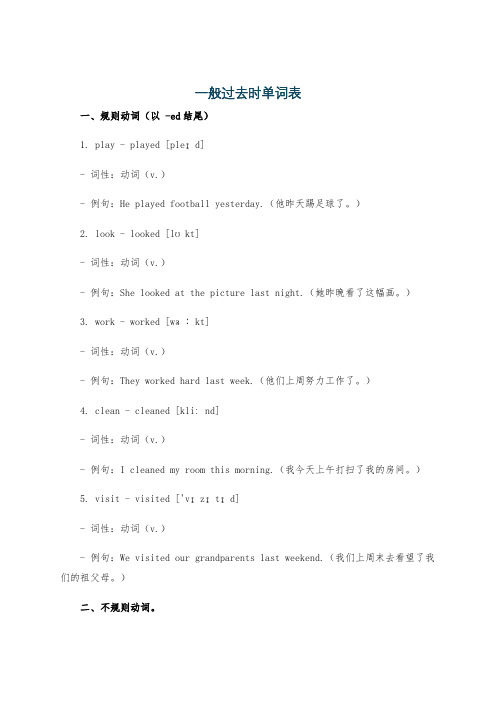
一般过去时单词表一、规则动词(以 -ed结尾)1. play - played [pleɪd]- 词性:动词(v.)- 例句:He played football yesterday.(他昨天踢足球了。
)2. look - looked [lʊkt]- 词性:动词(v.)- 例句:She looked at the picture last night.(她昨晚看了这幅画。
)3. work - worked [wɜːkt]- 词性:动词(v.)- 例句:They worked hard last week.(他们上周努力工作了。
)4. clean - cleaned [kliːnd]- 词性:动词(v.)- 例句:I cleaned my room this morning.(我今天上午打扫了我的房间。
)5. visit - visited ['vɪzɪtɪd]- 词性:动词(v.)- 例句:We visited our grandparents last weekend.(我们上周末去看望了我们的祖父母。
)二、不规则动词。
1. go - went [went]- 词性:动词(v.)- 例句:He went to school by bike yesterday.(他昨天骑自行车去上学了。
)2. see - saw [sɔː]- 词性:动词(v.)- 例句:I saw a movie last night.(我昨晚看了一部电影。
)3. eat - ate [eɪt]- 词性:动词(v.)- 例句:She ate an apple this morning.(她今天上午吃了一个苹果。
)4. come - came [keɪm]- 词性:动词(v.)- 例句:They came to my house last Sunday.(他们上周日来到了我家。
)5. do - did [dɪd]- 词性:动词(v.)- 例句:What did you do yesterday?(你昨天做了什么?)6. have - had [hæd]- 词性:动词(v.)- 例句:He had a great time at the party last night.(他昨晚在聚会上玩得很开心。
(完整)小学英语语法时态一般过去时详解
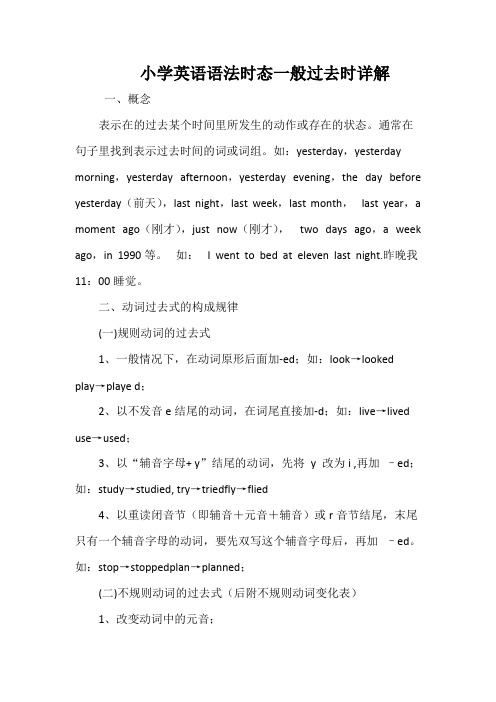
小学英语语法时态一般过去时详解一、概念表示在的过去某个时间里所发生的动作或存在的状态。
通常在句子里找到表示过去时间的词或词组。
如:yesterday,yesterday morning,yesterday afternoon,yesterday evening,the day before yesterday(前天),last night,last week,last month,last year,a moment ago(刚才),just now(刚才),two days ago,a week ago,in 1990等。
如:I went to bed at eleven last night.昨晚我11:00睡觉。
二、动词过去式的构成规律(一)规则动词的过去式1、一般情况下,在动词原形后面加-ed;如:look→looked play→playe d;2、以不发音e结尾的动词,在词尾直接加-d;如:live→lived use→used;3、以“辅音字母+ y”结尾的动词,先将y 改为i ,再加–ed;如:study→studied, try→triedfly→flied4、以重读闭音节(即辅音+元音+辅音)或r音节结尾,末尾只有一个辅音字母的动词,要先双写这个辅音字母后,再加–ed。
如:stop→stoppedplan→planned;(二)不规则动词的过去式(后附不规则动词变化表)1、改变动词中的元音;begin→began drink→drank come→came eat→ate grow→grew run→ran know→knew win→wonspeak→spoketake→took write→wrote get→got2、变词尾的–d 为–t ;build→built lend→lent send→sent spend→spent bend→bent3、与动词原形一样;cut→cut put→put cost→cost hurt→hurt shut→shut4、变-ay 为-aid (少数动词);say→said pay→paid lay→laid5、采用不同词根;sell→sold teach→taught buy→bought6、其他。
外研社(三起)小学英语六年级下册一般过去时
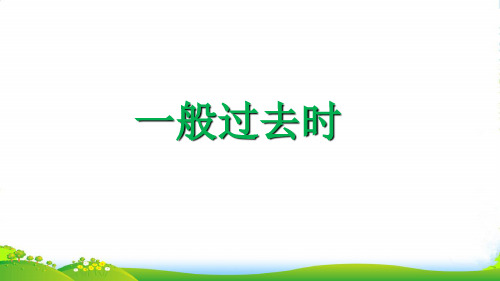
Infinitive am / is are begin break bring build buy can
常见不规则动词
Past tense was were began broke brought built bought could
__D_i_d__ he __f_in_d_ ___a_n_y_ meat in the fridge?
3. She stayed there for a week.(对画线部分提问)
__H_o_w__ __lo_n_g__ __d_id__ she _s_t_ay__ there?Leabharlann That’s great!
1. Xiao Lin went fishing this morning.(改为一般疑问句) 2. We visited our teacher last night.(就画线部分提问) 3. He had lunch at school.(改为否定句) 4. There was some milk in the bottle. (就画线部分提问) 5. He went to that city with his uncle. (改为一般疑问句)
行为动词的一般过去式: a. 规则动词的变化规则: (1)一般动词直接加-ed (2)以e结尾的动词直接加-d (3)以辅音字母加y结尾的词,变y为i再加-ed (4)以重读闭音节结尾,词尾只有一个辅音字母,双写辅音字母加-ed
注:规则动词过去式的发音: 在清辅音后读/t/,在元音和浊辅音后读/d/,在辅音/t/,/d/后读 /id/。 b. 不规则动词变化需参看不规则动词表逐一熟记。
Exercise
按要求完成下列句子。
1. Lucy did her homework at home.(改为否定句)
(完整版)小学英语一般过去时总结(可编辑修改word版)
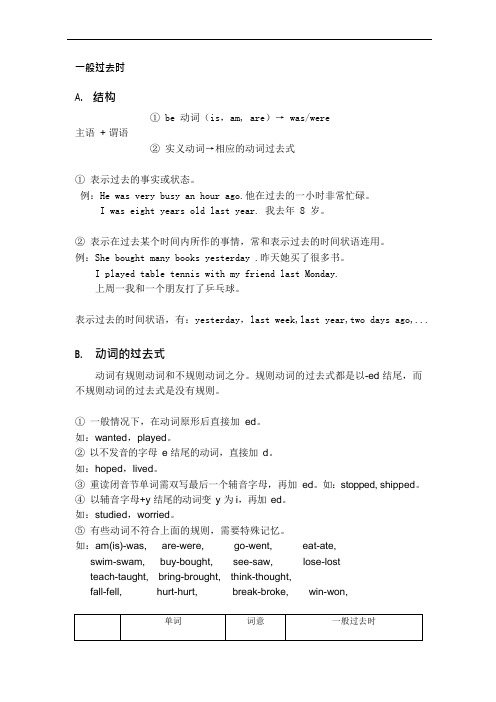
一般过去时A.结构① be 动词(is,am, are)→ was/were主语+ 谓语②实义动词→相应的动词过去式①表示过去的事实或状态。
例:He was very busy an hour ago.他在过去的一小时非常忙碌。
I was eight years old last year. 我去年 8 岁。
②表示在过去某个时间内所作的事情,常和表示过去的时间状语连用。
例:She bought many books yesterday .昨天她买了很多书。
I played table tennis with my friend last Monday.上周一我和一个朋友打了乒乓球。
表示过去的时间状语,有:yesterday,last week,last year,two days ago,...B. 动词的过去式动词有规则动词和不规则动词之分。
规则动词的过去式都是以-ed 结尾,而不规则动词的过去式是没有规则。
①一般情况下,在动词原形后直接加ed。
如:wanted,played。
②以不发音的字母e 结尾的动词,直接加d。
如:hoped,lived。
③重读闭音节单词需双写最后一个辅音字母,再加ed。
如:stopped, shipped。
④以辅音字母+y 结尾的动词变y 为i,再加ed。
如:studied,worried。
⑤有些动词不符合上面的规则,需要特殊记忆。
如:am(is)-was, are-were, go-went, eat-ate,swim-swam, buy-bought, see-saw, lose-lostteach-taught, bring-brought, think-thought,fall-fell, hurt-hurt, break-broke, win-won,直接加edwalk 走climb 爬turn 转弯learn 学习cook dinner 做饭play the piano 弹钢琴visit grandparents 看望(外)祖父母clean the bedroom 打扫卧室wash the clothes 洗衣服answer the phone 接电话listen to music 听音乐clean the room 打扫房间collect insects 收集昆虫jump 跳row 划work 工作show 展示look 看help 帮助relax 放松return 归还pass 传递watch insects 观察昆虫pick up leaves 采摘树叶paint 绘画kick 踢ski 滑雪直接加dlike 像,喜欢live 居住dance 跳舞use a computer 使用计算机love 爱taste 尝close 关上prepare 准备不规则变化eat 吃have 有;吃buy 买take 买;带go 去sing 唱歌teach(taught)教run(ran)跑fight(fought)打架get up 起床swim 游泳fly 飞swing(swung)荡sleep(slept)睡觉sweep(swept) the floor 扫地do 做make the bed 铺床draw(drew) pictures 画画write(wrote) a letter 写信catch(caught)butterflies 捉蝴蝶meet(met) 见面drink(drank)喝tell(told)告诉ride(rode)骑find(found)寻找到drive(drove)驾驶come(came)来become(became)变成feel(felt)感觉到think(thought)思考meet(met)遇见fall(fell)落下leave 离开wake(woke) up 醒来bring 带来is am are see 看到grow 种植grew stand(stood)站立词形不变read books 读书put 放set the table 摆饭桌hit (hit)撞击、打cut 切、割最后一个字母双写再加edstop(stopped)停shop 购物把y 变成i 再加edempty the trash 倒垃圾study 学习C. 过去式的肯定、否定、疑问及简短回答①过去式的肯定、否定、疑问及简短回答的形式可表示如下:肯定句I (He, She, We, You, They) went there by bus.否定句I (He, She, We, You, They) didn't go there by bus.疑问句Did I (he, she, we, you ,they) go the by bus?简短回答Yes, I (He, She, We, You, They) did.No, I (He, She, We, You, They) didn't.动词be 的肯定、否定、疑问及简短回答形式如下:肯定句I (He, She) was there.We (You, They) were there.否定句I (He, She) wasn't there.We (You, They) weren't there疑问句Was I (he, she) there?Were we (you, they) there?简短回答No, I (he, she) wasn't.we (you, they) weren't.一、将下列动词变成过去式。
(完整版)小学英语一般过去时习题及答案

练习一用括号内所给词的适当形式填空1. We ________ (enjoy) ourselves at the party last night.___________ (study) for the English test last Sunday.you _____ (go) to the Great Wall last yearold man ______ (be)ill and went to see a doctor._______ (have) a party last night._________ (visit) the museum and went home.7. —How _______ (be) the students —They were very friendly.often ________ (eat) dinner at home. Today he ________ (eat) dinner at school.9. — ______ he ______ (have) lunch at nine —No, he didn 't. ________ (buy) a piano yesterday._________ (make) him cry ( 哭) just nowyear the teacher _____________ (tell) us that the earth movesaround the sun.练习二用所给动词的适当形式填空and Mary __________ (come) to China last month.(not go) to bed until 1 2 o ' clock last night. (read) English yesterday morning.________ (be) no one here a moment ago.__________ (call) Mike this morning. listened but (hear) nothing.__________ (begin) to learn Chinese last year.week we _________ (pick) many apples on the farm.mother _______________ (not do) housework yesterday.watches TV every evening. But she _________________ (not watch) TV last night.your father _______ ( go ) to work every day last year12. When _____ you ___ (get) to Beijing yesterday We ____ (get)1. Hecamehere last mon th.(改为否定句)He __________________ here last mon th.played football this morning.(改为一般疑问句并作简略回答)— _____ they ______ f ootball this morni ng —Y es, they _____ . / No, they ______ .to Beijing at 9:00 句型转换went to Beijing last year.(就划线部分提问)__________________ t hey ________ last year.watched TV last night.(改为一般疑问句) __________ Tom ________ TV last ni ghtdoes homework every day.(用last night 改写句子)Mary _______________________________________ .6. He s cleaning his rooms. (戈U 线提问)_____ ______ h e _______7. My family went to the beach last week. (戈U 线提问)_______ ________ ________ family __________ last week按要求变换句型1. Father bought me a new bike. (同义句)Father bought 2. Frank read an in teresti ng book about history. (一般疑问句)an in terest ing book about history7. They read En glish last ni ght.否定句: ____________________________________ 般疑问句Thomas RMB 10 on this book.4. I had some friends. ( ——一 般 疑问句) friends5. Sally did some dish in the morning. (否定句)Sally dish in the morni ng.6. He is a tall and thin boy.(戈U 线提 问) he(否定句)me.______ Frank 3. Thomas spent RMB 10 on this book.对划线部分提问: ___________________________________________________________ a telephone call for you just now. (be)_________ not enough people to pick apples that day. ( be)____________ any hospitals ( 医院) in myhometown( 家乡) in 1940. ( be not)___________ enough milk at home last week, wasn 't there___________ to Japan last week. ( move)20. - When _______ you _________ (come) to China - Last year.she ________ (have) supper at home___________ (not clean) the room just now.(be) it cold in your city yesterdaymany people _______ (be) there in your class last term_______ (be) hot yesterday and most children ________________ (be) outside.26. There _______ (be) a football match on TV yesterday evening,but I ________ (have) no time to watch it.27. He ate some bread and ________ (drink) some milk.28. ______ he _________ (finish) his homework last night29. I _________(be) tired yesterday.30. I _________(gain ) Arts degree last year.31. What _______ you __________ (do) last night32. My grandfather _______ (leave) Hong Kong for New York in 1998.33. What ______ he ______ (do) yesterday34. Last week I _____ (buy) a new bike.35. He _______ (be) here just now.36. He ________ (not find ) his key last night.37. My father _________ (drink) a lot of wine yesterday.38. ______ you ______ (finish) your homework yesterday39. I _______ (eat) some eggs and bread this morning.40. Her mother ________ (not give) the girl any present.41. Last year Mr. Smith ____ (go ) to China and Japan.42. He ____ (have) a wonderful time.43. He ____ (do) a lot of different things and ___ (talk) toa great number of different people.44. He ___ (eat) Chinese and Japanese food and ____ (visit) alot of interesting places.45. When he ___ (go) back to England, he ____ (be) very tired.46. A week ago, Kitty and Ben _______ (be) in the countryside.47. At first, the wind ________ (blow) lightly.48. The leaves __________ (blow) slightly in the wind.49. They ______ (fly) their kite happily in the gentle breeze.50. Suddenly, the wind _______ (become) stronger.51. The clouds in the sky ______ (move) quickly.52. Leaves _______ (fall) from trees.53. The sky became dark. Kitty and Ben ______________ (go ) home immediately.54. Kitty and Ben ________ (stay) at home. They ___________ (watch) TV.65. The big clean-up _______ (begin) immediately. Kitty and Benwent outside again.、用所给动词的正确时态填空1. He___ ____ TV every evening. (watch)2. We always_______________ to school on foot. (go)3. Tom, with his classmates, often __ football aft er school(play)4. Their classroom _____ four big windows. (have)5. Your shoes ___ under the bed. (be)6. She _ ____ for her friends at the bus stop now. (wait)7. Sorry, I ___________ no enough money with me now. (have)8. The days _________ longer and longer now. (get)9. _____ here and _________ by me. (come, stand)10. Look, the bus ___________ . (come)11. His uncle usually ______________ to work by bus. (go)12. Sorry, I 'm busy. I ______________ to a friend of mine inHangzhou. (write)13. Lin Tao and his classmates _____________ on a farm nextweek. (work)14. We __ to the Great Wall if it __ finetomorrow. (go, be)15. Look at the cloud I think it (rain)16. Mary ___thirteen next year. (be)17. Today is Monday. Tomorrow ______ Tuesday. (be)18. There ___ no hospitals here ten years ago. (be)19. He _______ you to the station tomorrow morning. (see)20. It ________ very hard. We'd better stay at home. (rain)21. I always ________ up at six in the morning, but I____ up a little later yesterday. (get )22. She _______ swim very well when she was five years old. (can)23. They ________ in Beijing in 1960. (be)24. He always _________ to work by bike when he was in Shanghai. (go)25. I ______ you up as soon as I _______________ to Nanjing. ( ring, get)26. They never ___________ in the room. (smoke)27. I _____ to school yesterday because I _______________ ill. (n ot go, be)28. John ________ like his father. (look)29. Be quiet. The baby ____________ .(sleep)30. Some young people __________ in the lake. (swim)五、选择填空( ) 1. Lee _________ his mobile phone at home.A. leaveB. leavesC. leavedD. left( ) 2. ______ he ______ a good rest No, he didn ' t.A. Do, hadB. Did, haveC. Did, hadD. Was, had( ) 3. As soon as he _________ , he _____ to his family.A. arrived, writesB. arrived, writtenC. arrived, wroteD. arriveds, write ( ) 4. Mr. Black was late because he _______ his way.A. lostedB. loseC. losesD. lost( ) 5. When __________ Lee _______ school this morningA. did, got toB. did, get toC. did, getD. did, got( ) 6. Will you please say it again I _________ quite ______you.A. didn 't, hearB. don 't, heardC. didn 't, heardD. don 't, hear( ) 7. ______ you _______ at six o ' clock yesterdayA. Do ,get upB. Did, get upC. Do, got upD. Did, gotup( ) did you see __________A. nowB. every dayC. these daysD. just now( ) went into the room and ________ the door.A. lockB. lockingC. locksD. locked( ) 10. —What __________ you ______ last week —I bought a bag.A. did ,buyB. did , boughtC. do, buyD. do, bought( ) 11. —____________ he ___ his lunch —Yes, he did.A. Does ,hasB. Does, haveC. Did, haveD. Did, had( )12. —Did the thieves _____ into the car —No, they ______ .A. fell, didn ' tB. fall(落下),didC. jump (跳),didn ' tD.jump, did( ) 13. -When did May come back from Hong Kong -She __ fromHong Kong last Friday.A. comebackB. comesbackC. returned backD. cameback( ) 14. ___ she ____ this dictionary in the bookshop nearbylast weekA. Did, buyB. Does, buyC. Did, boughtD. Does, buys( ) 15. He ___ to the station this morning and was ______ forthe train.A. hurry, in timeB. hurries, on timeC. hurried, in timeD. hurried, at time ( ) 16. Where _____ Uncle Sun yesterday A. was B. were C.did D. does( ) 17. —Have you seen him today —Yes, I __________ him this morning.A. seeingB. seeC. seesD. saw( ) 18. He _________ worried when he heard the news. A. is B.was C. does D. did( ) 19. There ______ a telephone call for my brother StevenyesterdayA. isB. areC. wasD. were( ) 20. Liu Fengwei __________ three yuan for the lost library book.A. paidB. payC. spentD. lost( ) 21. He ____ in this school in 1958.A. taughtB. teachC. teachesD. teaching( ) 22. They ______ tired so they stopped ____ a rest.A. are, haveB. were, haveC. were, to haveD. are, having( ) 23. Yesterday I __________ in bed all day because I had a fever.A. layB. lieC. laidD. lied( ) 24. It was raining hard when he _____ home.A. gotB. getC. getsD. was getting( ) 25. She said her brother __________ in Beijing. He _______ to Japan on business last week.A. wasn ' t, wentB. hasn ' t, wentC. wasn ' t, goD.isn ' t, went答案、was did went had wasn' t weren' t spent cooked read clea ned lived studied二、did do did do went went三、 2. studied go 5. was had have四、't come play did didn ' t did go 4. Did watch homeworklast ni ght五、六、1. is-was 2. go-we nt 3. goes-we nt 4. can-could 5.saw-see 6. wasn't-didn ' t 7. didn 't-didn ' t do 8.wait-waited 9. fin d-fo und 10. did he-did he do七、 2. didn 't go , got 3. read 4. was 5. called 't do 't watch 11. Did go get got 13. made 14. told 16. were 't 't clean were had finish do do t find fin ish 't give 42. had talked visitedwas 46. were 47. blew watched、按要求变换句型read 's doing don't you 't spend were my going I any don't think she is Lily 's sister. 't dodoes look likedidn't read English last night. Did they read Englis h last night Yes,they did./No,they didn't. What did th ey do last night、用所给动词的正确时态填空:1. watches2. go3. plays4. has5. are6. is wait ing7. have8. are getting9. come, stand 10. is coming 11. goes12.am writing13. are going to work/will work 14. are going to / will go, is 15. is going to rain16. will be 17. will be 18. were 19 . will see 20. is raining 21. get, got 22. Could 23. were 24. w ent 25. will/shall ring, get 26. smoke 27. didn't go, was 28. looks 29. is sleeping 30. are swimmingnew bike for。
(完整版)小学六年级英语一般过去时

第十七讲一般过去时一. 概念一般过去时表示过去某个时间发生的动作或存在的状态,常和表示过去的时间状语连用。
一般过去时也表示过去经常或反复发生的动作。
例句:1.I watched TV last night.我昨天晚上看电视。
2.What did you do yesterday?你昨天做了什么?3.They went to Beijing last year.他们去年去了北京。
二.用法1.表示过去发生的动作或状态,通常会有明确的表示过去的时间状语。
I went to the zoo yesterday.I stayed up last night.2.叙述过去连续发生的动作或状态。
This morning , I got up early , went out for a walk , then came back and cooked for my family .3.表示过去某一段不确定的时间内发生的动作或状态。
He worked in the store for 5 years.三.Be动词在一般过去时中的变化1. am 和is在一般过去时中变为was。
(was not=wasn't)2. are在一般过去时中变为were。
(were not=weren't)3. 带有was或were的句子,其否定、疑问的变化和is, am, are一样,即否定句在was或were后加not,一般疑问句把was或were调到句首。
四.句中没有be动词的一般过去时的句子1.否定句:didn't +动词原形,如:Jim didn't go home yesterday.2.一般疑问句:在句首加did,句子中的动词过去式变回原形。
如:Did Jim go home yesterday?3.特殊疑问句:疑问词+一般疑问句?如:What did Jim do yesterday?五.动词过去式变化规则1.一般在动词末尾加-ed,如:pull-pulled, cook-cooked2.结尾是e加d,如:taste-tasted3.末尾是辅音字母加一个元音字母和一个辅音字母的重读闭音节,应双写末尾的辅音字母,再加-ed,如:stop-stopped4.以“辅音字母+y”结尾的,变y为i,再加-ed,如:study-studied六.真题再现( ) 1. The boy the tree last week.A. is wateringB. watersC. watered2. I _____(see) his name in the newspaper yesterday.因为句中出现了表示过去的时间状语last week和yesterday,所以正确答案分别为:1. C2.saw精点精练一、用动词的适当形式填空。
小学英语语法一般过去时陈述句练习含详细答案

小学英语语法一般过去时陈述句练习一、一般过去时的定义一般过去时表示过去某一时刻或某一段时间所发生了的事情或存在的状态。
一般过去时常与表示过去的时间状语或从句连用。
如:yesterday, this morning, just now, two days ago, a moment ago, in May, the other day, las ight/year/weck, once upon a time, the other day, in the old days, in the past, when I was 8 years ole at+一个时间点。
一般过去时的句式结构:主语+动词过去式+其他。
如:I had it about ten minutes ago我是大约十分钟以前吃的。
It was just a small fishing village then.那时它只是一个小渔村。
We often played together when we were children.我们小时候常在一起玩。
I had a word with Julia this morning今天早晨,我跟朱丽亚说了几句话He smoked many cigarettes a day until he gaveup.他没戒烟那阵子,一天抽很多烟。
二、一般过去时的基本用法1.带有确定的过去时间状语时,要用过去时。
如: I had a party the other day.前几天我举行了一个聚会I met Lin Tao this morning.今天上午我遇见了林涛。
I was therea momentago.刚才我在那儿。
He bought the computer five years ago.他五年前买了这台电脑。
2.表示过去连续发生的动作时,要用过去时。
如:The boy opened his eyes for a moment, looked at the captain, and then died那男孩把眼睛张开了一会儿,看看船长,然后就去世了。
小学英语一般过去时态

一般过去时(PEP Book 8 Unit 3 Last Week / Unit 4 My Holidays)Hello, boys and girls! 今天我们讲一般过去时,分三个方面讲述,大家可要认真听哟!I. 一般过去时的概念一般过去时表示过去某个时间发生的动作或存在的状态。
常和表示过去的时间状语连用。
如:last year, yesterday等;也可表示过去经常反复发生的动作,常和often, always等频率副词连用。
例如:①I saw him in the street yesterday. 昨天我在街上看见他了。
②Li Mei always went to school on foot last year. 去年李梅总是步行上学。
II. 一般过去时的构成动词过去式的构成:(1)规则动词过去式的构成有四条规则:①一般在动词原形末尾直接加上-ed。
如:look-looked。
②以不发音的字母e结尾的动词,去e再加-ed。
如:live-lived。
③末尾只有一个辅音字母的重读闭音节,先双写这个辅音字母,再加-ed。
如:stop-stopped。
④末尾是辅音字母+y结尾的动词,先变y为i,然后再加-ed。
如:study-studied。
(2)不规则动词的过去式需特殊记忆。
如:am(is)-was, are-were, go-went, come-came, take-took, have (has)-had等。
III. 一般过去时的几种句型肯定句结构为:主语+动词的过去式+其它。
如:He went to the toy store yesterday. 他昨天去玩具店了。
否定句结构为:主语+did not (didn't)+动词原形+其它。
如:He didn't go to the toy store yesterday. 他昨天没去玩具店。
一般过去时的一般疑问句的构成:Did+主语+动词原形+其它?如:1) -Did you go to Beijing last week?-Yes, we did. (No, we didn't.)2) -Did you meet the businessman before?-No, I didn't. (Yes, I did.)一般过去时的特殊疑问句的构成:疑问词+did+主语+动词原形+其它?如:1) -What did you do last night?-I did my homework.2) -Where did you go last week?-I went to Shanghai with my parents.一般过去时口诀一般过去时并不难,表示过去动作、状态记心间。
(完整版)小学英语动词过去式的变化规则
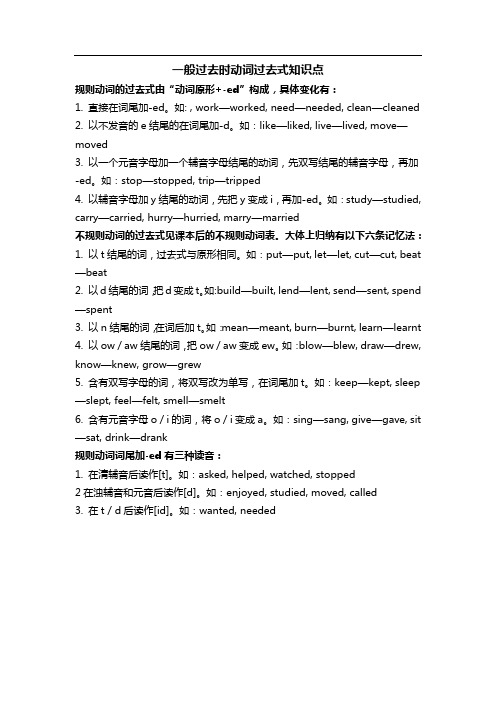
一般过去时动词过去式知识点规则动词的过去式由“动词原形+-ed”构成,具体变化有:1. 直接在词尾加-ed。
如: , work—worked, need—needed, clean—cleaned2. 以不发音的e结尾的在词尾加-d。
如:like—liked, live—lived, move—moved3. 以一个元音字母加一个辅音字母结尾的动词,先双写结尾的辅音字母,再加-ed。
如:stop—stopped, trip—tripped4. 以辅音字母加y结尾的动词,先把y变成i,再加-ed。
如:study—studied, carry—carried, hurry—hurried, marry—married不规则动词的过去式见课本后的不规则动词表。
大体上归纳有以下六条记忆法:1. 以t结尾的词,过去式与原形相同。
如:put—put, let—let, cut—cut, beat —beat2. 以d结尾的词,把d变成t。
如:build—built, lend—lent, send—sent, spend —spent3. 以n结尾的词,在词后加t。
如:mean—meant, burn—burnt, learn—learnt4. 以ow / aw结尾的词,把ow / aw变成ew。
如:blow—blew, draw—drew, know—knew, grow—grew5. 含有双写字母的词,将双写改为单写,在词尾加t。
如:keep—kept, sleep —slept, feel—felt, smell—smelt6. 含有元音字母o / i的词,将o / i变成a。
如:sing—sang, give—gave, sit —sat, drink—drank规则动词词尾加-ed有三种读音:1. 在清辅音后读作[t]。
如:asked, helped, watched, stopped2在浊辅音和元音后读作[d]。
小学英语一般过去时
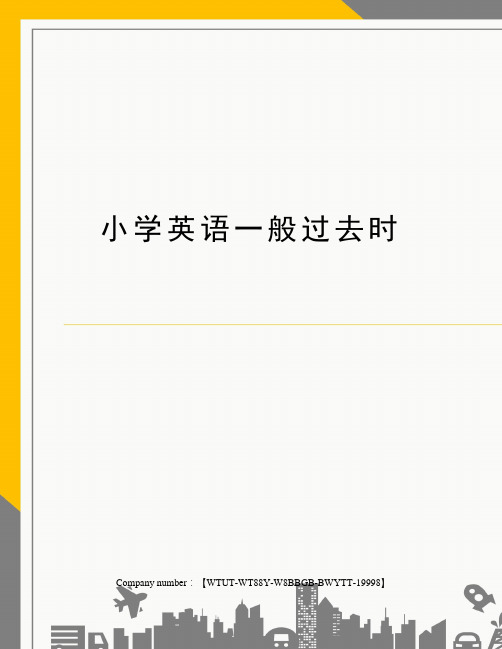
小学英语一般过去时 Company number:【WTUT-WT88Y-W8BBGB-BWYTT-19998】一般过去时A.结构① be动词(is,am, are)→ was/were主语 + 谓语②实义动词→相应的动词过去式①表示过去的事实或状态。
例:He was very busy an hour ago.他在过去的一小时非常忙碌。
I was eight years old last year. 我去年8岁。
②表示在过去某个时间内所作的事情,常和表示过去的时间状语连用。
例:She bought many books yesterday .昨天她买了很多书。
I played table tennis with my friend last Monday.上周一我和一个朋友打了乒乓球。
表示过去的时间状语,有:yesterday,last week ,last year, two days ago,...B.动词的过去式动词有规则动词和不规则动词之分。
规则动词的过去式都是以-ed结尾,而不规则动词的过去式是没有规则。
①一般情况下,在动词原形后直接加ed。
如:wanted,played。
②以不发音的字母e结尾的动词,直接加d。
如:hoped,lived。
③重读闭音节单词需双写最后一个辅音字母,再加ed。
如:stopped, shipped。
④以辅音字母+y结尾的动词变y为i,再加ed。
如:studied,worried。
⑤有些动词不符合上面的规则,需要特殊记忆。
如:am(is)-was, are-were, go-went, eat-ate,swim-swam, buy-bought, see-saw, lose-lost teach-taught, bring-brought, think-thought,直接加edwalk走____________ climb爬_____________turn转弯____________ learn学习_____________cook dinner做饭____________ play the piano弹钢琴____________ visit grandparents看望(外)祖父母__________________________ clean the bedroom打扫卧室__________________________wash the clothes洗衣服__________________________answer the phone接电话__________________________listen to music听音乐__________________________clean the room打扫房间__________________________collect insects收集昆虫__________________________jump跳____________row划____________work工作____________show展示____________ look看____________ help帮助____________relax放松___________ return 归还_____________ pass传递______________ watch insects观察昆虫_____________________________________pick up leaves采摘树叶___________________________________paint绘画______________ kick踢______________ ski 滑雪______________ 直接加dlike像,喜欢______________ live居住______________dance跳舞______________ use a computer使用计算机______________ love爱______________ taste尝______________close关上______________ prepare准备_____________不规则变化eat吃____________ have有;吃____________ buy买____________ take买;带____________ go去____________ sing唱歌____________ teach(taught)教 run(ran)跑 fight(fought)打架get up起床____________ swim游泳____________ fly飞____________swing(swung)荡 sleep(slept)睡觉 sweep(swept) the floor扫地do做____________make the bed铺床____________draw(drew) pictures画画 write(wrote) a letter写信catch(caught)butterflies捉蝴蝶 meet(met)见面drink(drank)喝 tell(told)告诉 ride(rode)骑 find(found)寻找到drive(drove)驾驶 come(came)来 become(became)变成feel(felt)感觉到think(thought)思考meet(met)遇见fall(fell)落下leave离开_____________wake(woke) up醒来 bring带来____________is___________ am___________ are____________ see看到_________grow种植 grew stand(stood)站立词形不变read books读书__________________put放__________________set the table摆饭桌__________________ hit (hit)撞击、打 cut 切、割_______ 最后一个字母双写再加edstop(stopped)停 shop购物 __________________把y变成i再加edempty the trash倒垃圾__________________study学习______________________C.过去式的肯定、否定、疑问及简短回答①过去式的肯定、否定、疑问及简短回答的形式可表示如下:肯定句I (He, She, We, You, They) went there by bus.否定句I (He, She, We, You, They) didn't go there by bus.疑问句Did I (he, she, we, you ,they) go the by bus简短回答Yes, I (He, She, We, You, They) did.No, I (He, She, We, You, They) didn't.②动词be的肯定、否定、疑问及简短回答形式如下:肯定句I (He, She) was there.We (You, They) were there.否定句I (He, She) wasn't there.We (You, They) weren't there疑问句Was I (he, she) thereWere we (you, they) there简短回答No, I (he, she) wasn't.we (you, they) weren't.。
小学英语 语法详解- 02.一般过去时

英语一般过去时定义表示在的过去某个时间里所发生的动作或存在的状态。
构成一般过去时的句式变化1.陈述句:主语+动词过去式+其他I saw the rianbow yesterday.我昨天看到了彩虹。
They went to he park last Sunday.上周日他们去了公园。
Ben got up at six this morning.本今天早上是六点起床的。
2.一般疑问句1)将be动词提到句首陈述句:It was an egg yesterday.它昨天还是一个蛋。
一般疑问句:Was it an egg yesterday?它昨天还是一个蛋吗?陈述句:They were at school just now.他们刚才还在学校。
一般疑问句:Were they at school just now?他们刚才还在学校吗?Linda老师的小提醒主语是第一人称和第二人称的句子,其过去时变化时,要注意be动词的变化。
一般疑问句:Were you at home last night?你昨天晚上在家吗?肯定回答:Yes,I was.否定回答:No,I wasn't.2)用助动词did陈述句:I did my homework at school,我在学校做了作业。
一般疑问句:Did you do your homework at school?你在学校做作业了吗?陈述句:They played basketball just now.他们刚才打了篮球。
一般疑问句:Did they play basketball just now?他们刚才打篮球了吗?小提醒由过去时态的陈述句变一般疑问句时,变化技巧上可以用拆分法,将动词过去式拆分为did+动词原形,然后将did提到句首,这样就不容易发生错误。
He slept a whole day.他睡了一整天。
第一步:先将slept拆分为did sleep第二步:将did提到句首变成:Did he sleep a whole day?他睡了一整天吗?3.否定句1)在be动词后面+not陈述句:I was a teacher twenty years ago.我20年前是一名老师。
小学英语过去式讲解(附练习及答案)
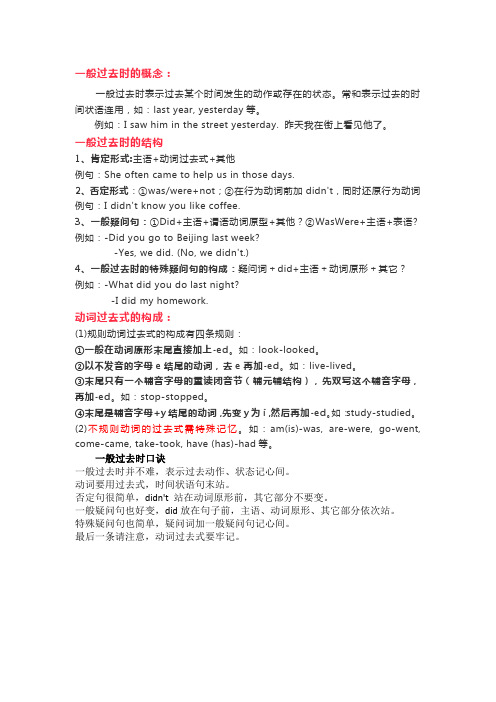
一般过去时的概念:一般过去时表示过去某个时间发生的动作或存在的状态。
常和表示过去的时间状语连用,如:last year, yesterday等。
例如:I saw him in the street yesterday. 昨天我在街上看见他了。
一般过去时的结构1、肯定形式:主语+动词过去式+其他例句:She often came to help us in those days.2、否定形式:①was/were+not;②在行为动词前加didn't,同时还原行为动词例句:I didn't know you like coffee.3、一般疑问句:①Did+主语+谓语动词原型+其他?②WasWere+主语+表语?例如:-Did you go to Beijing last week?-Yes, we did. (No, we didn't.)4、一般过去时的特殊疑问句的构成:疑问词+did+主语+动词原形+其它?例如:-What did you do last night?-I did my homework.动词过去式的构成:(1)规则动词过去式的构成有四条规则:①一般在动词原形末尾直接加上-ed。
如:look-looked。
②以不发音的字母e结尾的动词,去e再加-ed。
如:live-lived。
③末尾只有一个辅音字母的重读闭音节(辅元辅结构),先双写这个辅音字母,再加-ed。
如:stop-stopped。
④末尾是辅音字母+y结尾的动词,先变y为i,然后再加-ed。
如:study-studied。
(2)不规则动词的过去式需特殊记忆。
如:am(is)-was, are-were, go-went, come-came, take-took, have (has)-had等。
一般过去时口诀一般过去时并不难,表示过去动作、状态记心间。
动词要用过去式,时间状语句末站。
否定句很简单,didn't 站在动词原形前,其它部分不要变。
一般过去时_小学六年级英语
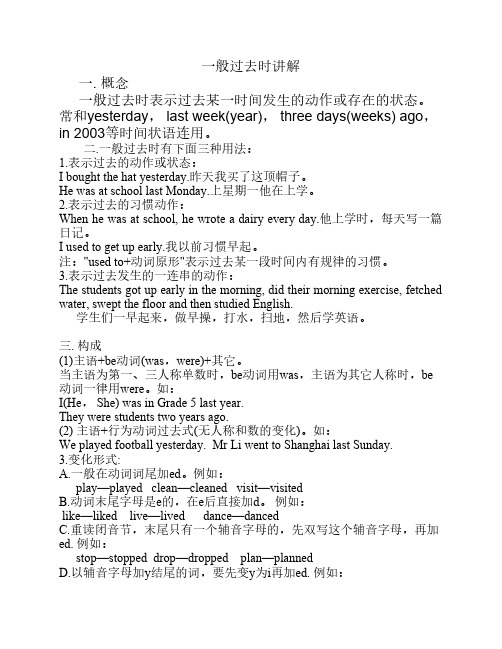
一般过去时讲解一. 概念一般过去时表示过去某一时间发生的动作或存在的状态。
常和yesterday, last week(year), three days(weeks) ago,in 2003等时间状语连用。
二.一般过去时有下面三种用法:1.表示过去的动作或状态:I bought the hat yesterday.昨天我买了这顶帽子。
He was at school last Monday.上星期一他在上学。
2.表示过去的习惯动作:When he was at school, he wrote a dairy every day.他上学时,每天写一篇日记。
I used to get up early.我以前习惯早起。
注:"used to+动词原形"表示过去某一段时间内有规律的习惯。
3.表示过去发生的一连串的动作:The students got up early in the morning, did their morning exercise, fetched water, swept the floor and then studied English.学生们一早起来,做早操,打水,扫地,然后学英语。
三. 构成(1)主语+be动词(was,were)+其它。
当主语为第一、三人称单数时,be动词用was,主语为其它人称时,be 动词一律用were。
如:I(He, She) was in Grade 5 last year.They were students two years ago.(2) 主语+行为动词过去式(无人称和数的变化)。
如:We played football yesterday. Mr Li went to Shanghai last Sunday.3.变化形式:A.一般在动词词尾加ed。
例如:play—played clean—cleaned visit—visitedB.动词末尾字母是e的,在e后直接加d。
(完整版)一般过去时讲解及练习
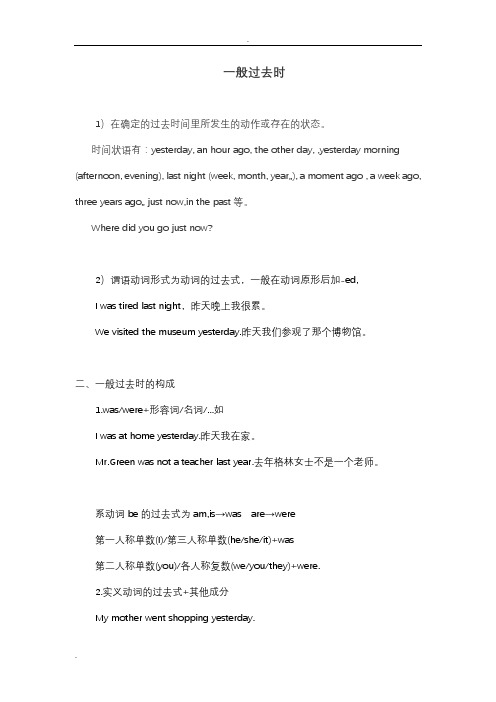
一般过去时1)在确定的过去时间里所发生的动作或存在的状态。
时间状语有:yesterday, an hour ago, the other day, ,yesterday morning (afternoon, evening), last night (week, month, year…), a moment ago , a week ago, three years ago… just now,in the past等。
Where did you go just now?2)谓语动词形式为动词的过去式,一般在动词原形后加-ed,I was tired last night,昨天晚上我很累。
We visited the museum yesterday.昨天我们参观了那个博物馆。
二、一般过去时的构成1.was/were+形容词/名词/...如I was at home yesterday.昨天我在家。
Mr.Green was not a teacher last year.去年格林女士不是一个老师。
系动词be的过去式为am,is→was are→were第一人称单数(I)/第三人称单数(he/she/it)+was第二人称单数(you)/各人称复数(we/you/they)+were.2.实义动词的过去式+其他成分My mother went shopping yesterday.我妈妈昨天去购物了。
His uncle worked in Beijing in 2014.他叔叔2014年在北京工作。
三、一般过去时的句式四、动词过去式的变化规则3 used toused to + do:"过去常常"表示过去习惯性的动作或状态,但如今已不存在。
Mother used to take a walk. (过去常常散步)二、构成及变化1. Be动词在一般过去时中的变化:am 和is在一般过去时中变为was。
完整版)小学英语一般过去时习题及答案

完整版)小学英语一般过去时习题及答案练一:1.XXX at the party last night.2.XXX studied for the English test last Sunday.3.Did you go to the Great Wall last year?4.The old man was ill and went to see a doctor.5.We had a party last night.6.We visited the museum and then went home.7.How were the students。
They were very friendly.8.He often eats XXX.9.Did he have lunch at nine。
No。
he XXX't.10.XXX.11.What made him cry just now?st year the teacher told us that the earth moves around the sun.练二:1.Tom and Mary came to China last month.2.Mike did not go to bed until 12 o'clock last night.3.Mary read English XXX.4.There was no one here a moment ago.5.I called Mike this morning.6.I XXX but heard nothing.7.Tom began learning Chinese last year.st week。
we picked many apples on the farm.XXX.10.XXX。
But she did not watch TV last night.11.Did your father go to work every day last year?12.When did you get to Beijing yesterday。
小学英语语法一般过去时(包括练习)
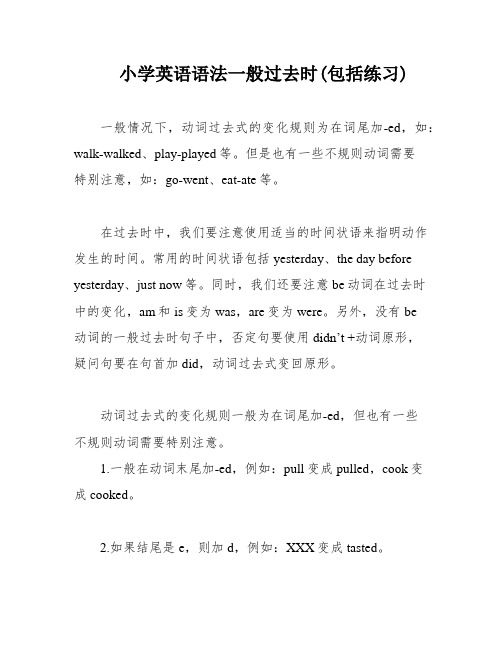
小学英语语法一般过去时(包括练习)一般情况下,动词过去式的变化规则为在词尾加-ed,如:walk-walked、play-played等。
但是也有一些不规则动词需要特别注意,如:go-went、eat-ate等。
在过去时中,我们要注意使用适当的时间状语来指明动作发生的时间。
常用的时间状语包括yesterday、the day before yesterday、just now等。
同时,我们还要注意be动词在过去时中的变化,am和is变为was,are变为were。
另外,没有be动词的一般过去时句子中,否定句要使用didn’t +动词原形,疑问句要在句首加did,动词过去式变回原形。
动词过去式的变化规则一般为在词尾加-ed,但也有一些不规则动词需要特别注意。
1.一般在动词末尾加-ed,例如:pull变成pulled,cook变成cooked。
2.如果结尾是e,则加d,例如:XXX变成tasted。
3.对于末尾只有一个元音字母和一个辅音字母的重读闭音节,应该双写末尾的辅音字母,再加-ed,例如:ped。
4.对于以“辅音字母+y”结尾的动词,需要变y为i,再加-ed,例如:study变成studied。
5.不规则动词过去式包括:am/is变成was,are变成were,begin变成began,speak变成spoke,swim变成swam,build变成built,spend变成spent,XXX变成took,buy变成bought,see变成saw,teach变成taught,run变成ran,stand变成stood,tell变成told,say变成said,sweep变成swept,think变成thought,will变成would,drive变成drove,know变成knew,write变成wrote,eat变成ate,learn变成learnt或learned,sing变成sang,feel变成felt,let变成let,sit变成sat,find变成found,make变成made,sleep变成slept,fly变成flew,mean变成meant,come变成came,ot,meet变成met,copy变成copied,get变成got,put变成put,do变成did,give变成gave,read变成read,draw变成drew,hear变成heard,ride变成rode,XXX变成drank,keep变成kept,ring变成rang。
小学英语一般过去时语法详解
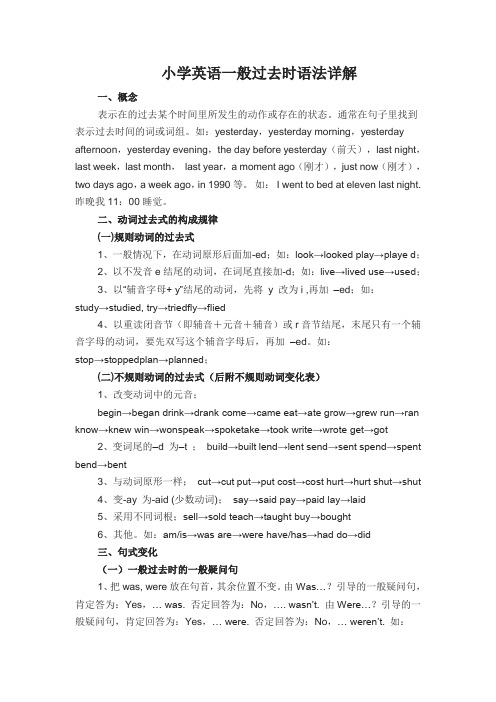
小学英语一般过去时语法详解一、概念表示在的过去某个时间里所发生的动作或存在的状态。
通常在句子里找到表示过去时间的词或词组。
如:yesterday,yesterday morning,yesterday afternoon,yesterday evening,the day before yesterday(前天),last night,last week,last month,last year,a moment ago(刚才),just now(刚才),two days ago,a week ago,in 1990等。
如:I went to bed at eleven last night.昨晚我11:00睡觉。
二、动词过去式的构成规律(一)规则动词的过去式1、一般情况下,在动词原形后面加-ed;如:look→looked play→playe d;2、以不发音e结尾的动词,在词尾直接加-d;如:live→lived use→used;3、以“辅音字母+ y”结尾的动词,先将y 改为i ,再加–ed;如:study→studied, try→triedfly→flied4、以重读闭音节(即辅音+元音+辅音)或r音节结尾,末尾只有一个辅音字母的动词,要先双写这个辅音字母后,再加–ed。
如:stop→stoppedplan→planned;(二)不规则动词的过去式(后附不规则动词变化表)1、改变动词中的元音;begin→began drink→drank come→came eat→ate grow→grew run→ran know→knew win→wonspeak→spoketake→took write→wrote get→got2、变词尾的–d 为–t ;bu ild→built lend→lent send→sent spend→spent bend→bent3、与动词原形一样;cut→cut put→put cost→cost hurt→hurt shut→shut4、变-ay 为-aid (少数动词);say→said pay→paid lay→laid5、采用不同词根;sell→sold teach→taught buy→bought6、其他。
小学一般过去时全面解析
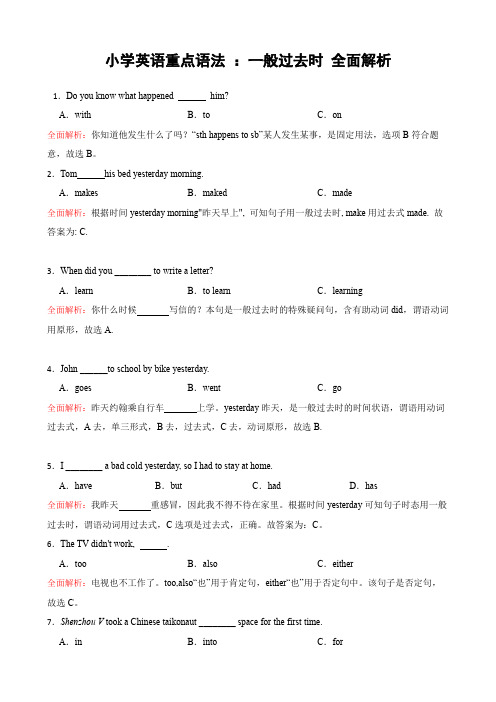
小学英语重点语法:一般过去时全面解析1.Do you know what happened him?A.with B.to C.on全面解析:你知道他发生什么了吗?“sth happens to sb”某人发生某事,是固定用法,选项B符合题意,故选B。
2.Tom his bed yesterday morning.A.makes B.maked C.made全面解析:根据时间yesterday morning"昨天早上", 可知句子用一般过去时, make用过去式made. 故答案为: C.3.When did you ________ to write a letter?A.learn B.to learn C.learning全面解析:你什么时候写信的?本句是一般过去时的特殊疑问句,含有助动词did,谓语动词用原形,故选A.4.John ______to school by bike yesterday.A.goes B.went C.go全面解析:昨天约翰乘自行车上学。
yesterday昨天,是一般过去时的时间状语,谓语用动词过去式,A去,单三形式,B去,过去式,C去,动词原形,故选B.5.I ________ a bad cold yesterday, so I had to stay at home.A.have B.but C.had D.has全面解析:我昨天重感冒,因此我不得不待在家里。
根据时间yesterday可知句子时态用一般过去时,谓语动词用过去式,C选项是过去式,正确。
故答案为:C。
6.The TV didn't work, .A.too B.also C.either全面解析:电视也不工作了。
too,also“也”用于肯定句,either“也”用于否定句中。
该句子是否定句,故选C。
7.Shenzhou V took a Chinese taikonaut ________ space for the first time.A.in B.into C.for全面解析:神舟V第一次把中国宇航员带进太空。
- 1、下载文档前请自行甄别文档内容的完整性,平台不提供额外的编辑、内容补充、找答案等附加服务。
- 2、"仅部分预览"的文档,不可在线预览部分如存在完整性等问题,可反馈申请退款(可完整预览的文档不适用该条件!)。
- 3、如文档侵犯您的权益,请联系客服反馈,我们会尽快为您处理(人工客服工作时间:9:00-18:30)。
肯定/否定回答: Yes, she did. No, she didn’t.
.
• 3. I read an English book last week.
一般疑问句: • Did you read an English book last week?
否定句: →She didn’t play the violin last night.
肯定句: They swam in the lake yesterday.
否定句: →They didn’t swim in the lake yesterday.
.
一般过去时否定句练习
肯定句: They made a kite a week ago. 否定句:They didn’t make a kite a week ago.
came(掌握) gave became
drink begin
drank(了解) began
.
剩余不规则动词
剩余不规则动词表 Infinitive Past Tense Infinitive Past Tense
am, is are do
go have make get
was were did
went had made got
Worry
Worryied
Early Happy
Earlyied Happyied
.
不规则动词 过去式的构成
1.过去式与原形一样(了解)
put→put (放下) let→let(让) cut → cut(砍,剪) read→read(读)
.
2.把元音字母变成“a”
come give Becomeeat源自atesay said
see saw
.
一般过去时 肯定句变否定句
Be动词类 • 否定句
实义动词类
.
1. (be动词类)在表示过去存在的状态 的句子中在was, were的后面加上not。
如: 肯定句:
He was in the park the day before yesterday. 否定句: →He was not in the park the day before yesterday.
肯定句: We were busy last week.
否定句: →We were not busy last week.
.
2.(行为动词类)要在行为动词的前面加助动词didn’t. 然后把 动词过去式改为动词原形。 即:didn’t + 动词原形
肯定句: She played the violin last night.
.
一般过去时一般疑问句及其肯否定回答 练习题
1. They had a good time in the park. 一般疑问句: Did they have a good time in the park? 肯定/否定回答: Yes, they did. No , they didn’t.
.
2. Ann did her homework yesterday evening.
名词变复数变化规则 • (一) 规则变化
名词单数变复数,直接加 -s 占多数; s, x, z, ch, sh 来结尾,直接加上 -es; 词尾是 f 或 fe,加 -s 之前先变 ve; 辅母 + y 在词尾,把 y 变 i 再加 -es; 词尾字母若是 o,常用三个已足够, 要加 -es 请记好,hero, tomato, potato。
• (二) 不规则变化 男人女人 a 变 e,鹅(goose)足(foot)牙(tooth) oo 变 ee; 老鼠(mouse)虱婆(louse)也好记,ous 变 ic; 孩子加上 ren,鱼鹿绵羊不用变。
一般过去时的用法与结构详解
• 表示:
时态和时间
past now
future
.
动词过去式 的构成
(1) He was born in Shanghai. → Was he born in Shanghai? (一般疑问句) →Yes, he was. (肯定回答) →No, he wasn’t. (否定回答)
.
一般过去时 1.一般过去时表示过去某个时间发生的动作或存在
的状态,常和表示过去的时间状语连用。 Yesterday(昨天),
last night(昨天晚上), last week (上周) Last Sunday(上周日)
in 1990 just now (刚才), long long ago(很久以前)
.
• (2)They were in Li Yan’s home last night. • → Were they in Li Yan’s home last night? • (一般疑问句) • →Yes, they were. (肯定回答) • →No, they weren’t. (否定回答)
.
2、结尾是 e 的动词只加 -- d (了解)
live hope use
lived hoped used
.
3.重读闭音节词, 先双写这个辅音字母,再加—ed
stop Pat
stopped Patted (掌握)
.
4. 以“辅音字母+y”结尾的词,
先变“y”为“i”再加—ed
study
studyied
肯定句: He was ill yesterday. 否定句:He was not ill yesterday.
肯定句:The cat ate a bird last night. 否定句:The cat didn’t eat a bird last night.
.
一般过去时的 一般疑问句
1.把was, were放在句首,其余位置不变。
规则动词
regular verbs
不规则动词
irregular verbs
.
规则动词 过去式的构成
1、一般在动词末尾加– ed
look Walk paint play
look ed Walked painted play ed
(掌握)
clean Visit Want cough watch
cleaned Visited Wanted coughed watched
